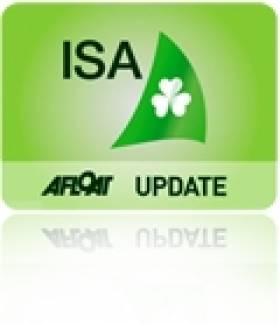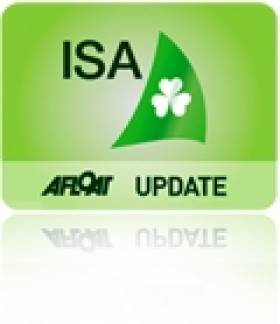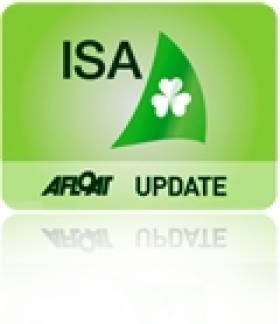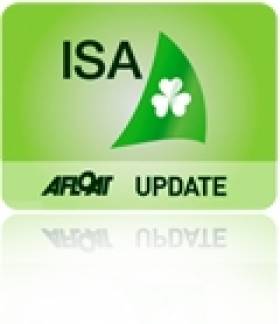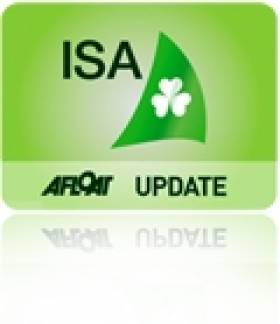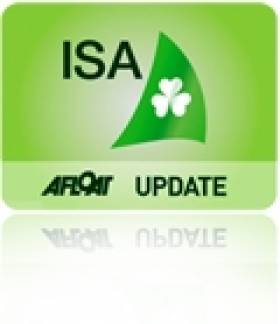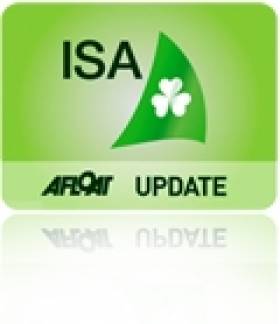Displaying items by tag: Irish Sailing Association
Irish Sailing Association Seeks CEO For New 'Irish Sailing Foundation'
#irishsailingfoundation – The Irish Sailing Association (ISA) is seeking a Chief Executive Officer for a new 'Irish Sailing Foundation' (ISF) to raise €2.75m annually in 'philantropic' sailing funding to 'improve performance at Olympic level, increase the level of competition for those on squads and widen access and participation'.
The announcement comes in the form of an advertisement for a CEO for the ISF in today's Irish Times newspaper. (download a copy of the advert below as a jpeg file).
Last month, the Irish Sailing Association (ISA) launched a strategic plan to 2020 with a mission to develop the sport 'in union' with clubs, training centres and associated organisations.
Today's advertisement says the successful candidate will be 'an exceptional leader with a track record of building income to this level in either the private or not–for–profit sector'. No salary details are supplied.
The closing date for applications is February 27th.
Further similar adverts appeared in The Sunday Times and Sunday Business Post of February 1
The ISA May Have Changed; Do Our Clubs & Classes Want To Change?
#isastrategicplan – Afloat's occasional blogger 'Magerhamore' listened to the recent presentation of the ISA Strategic Plan and question and answer session in Dun Laoghaire last Wednesday and the following thoughts have come to mind:
The ISA seems to have radically transformed it's attitude. The Strategic Plan sets out clear strategies for developing sailing. However, at the centre of these strategies is a clear mission for the ISA to assist and support Sailing Clubs, Sailing Classes and Training Centres. The ISA may have changed; do our clubs and classes want to change? If they do, then things will happen. If they do not then nothing will change.
The present club model is largely based on offering a service to a relatively small number of boat owners, their families and their crew (many of who may not be members of the club). Many potential sailors (and their parents) have neither the intention or the finance to purchase a boat. Furthermore, present training schemes do not necessarily teach the skills needed to maintain and improve a boat.
If sailing is to tap in to the large potential market for sailing then clubs will have to change model, and develop 'pay for play' type activities. It is important to emphasise that this 'pay for play' should not be limited to beginners. There are many pathways into competition at the very highest level for those who do not own their own boats, including team racing and match racing. Worldwide, many events are based on charter fleets and many class championships are dominated by club owned boats.
The skills to operate such schemes exist in Ireland... but not necessarily in the clubs. Many training centres own and operate large fleets of boats. That expertise needs to be transferred to the clubs.
The long term development of year round activities - training, coaching, running 'pay for play' requires a radical transformation of the training and employment of instructors and especially senior instructors. If clubs are to develop new activities then they need full time, permanently employed staff with the management skills to run a sailing base. There are many Irish sailors with the required experience and skills.Very few of them work in Ireland.
Sailing needs to be ambitious. We are an island nation with a similar population to New Zealand. We have an incredible playground, our lakes and coastal waters, on our doorsteps. Sailing should be one of Ireland's biggest participant sports. Our ambition,should be that in a few years there are more active participants in sailing (a sport for life) than in Gaelic Football, Soccer or Rugby. This will not happen without a complete transformation of the way we manage and develop our sport.
A potential future Irish Ben Ainslie may be living in Tallaght, Tullamore or Termonfeckin. He or she will probably never set foot on a boat, or never enter a sailing club. Without parents willing to spend considerable sums he or she will never attain their potential. Surely our role is to allow all of those who want to mess about in boats the opportunity to do so.
READ MORE FROM MAGHERAMORE? How clubs can cash in on sailing's spectator appeal; The 'Great Dinghy Sailing Debate' Means Questions for ISA & Yacht Clubs; Is 'Adventure Sailing' a New Tack for Dinghy Sailors?
Dublin Yacht Club Commodores First to Welcome New Irish Sailing Association (ISA) Strategic Plan
#sailing.ie – Dublin Yacht Club Commodores have been the first to greenlight a new Irish Sailing Association (ISA) agenda mapped out at the Royal St. George Yacht Club yesterday.
Over 60 gathered to hear former president Neil Murphy give details of the new five year strategic plan that was favourably received by a range of sailors who had plenty of questions for President David Lovegrove. Topics covered included; training, instructors, VHF certification, how dinghy classes fit in to the new arrangements and the association's new Regional Development Officer.
Afloat.ie reviewed the Strategic Plan HERE where it is also available to download as a PDF file.
The Plan is for the period 2015 - 2020 and is based on the views that were put to the Strategic Review Group. The SRG was asked by the Board in 2013 to assess where the Association stood and how it needed to adjust to better serve the sport of Sailing. The Board accepted its Report and tasked a group to prepare a new Strategic Plan for the ISA based on its contents.
Significantly, Norman Lee, the Wicklow based small boat sailor who sought – and has now got – fundamental change at the ISA, has welcomed the plan: 'My feelings are very positive, this has been a very positive and uplifting experience and if it continues in the way proposed, will turn Irish sailing around and be the prototype for similar change needed in other jurisdictions', he told Afloat.ie More from Norman on the topic HERE.
The underlying principle of the Plan is moving from a 'governance approach' to one of the principal stakeholders in the Sport working together with goal of encouraging and developing participation. The Association, Clubs, Training Centres, Classes and associated groups working in union to achieve those objectives underlies all of the strategies. There will be a renewed emphasis on utilising the input of volunteers to harness the skills and knowledge of active sailors so that the ISA can evolve and develop and respond to issues that arise.
'The initial vibe seems to be that the ISA has listened, strategised and truly re-connected with the Irish sailing community. Sure, there were valid issues raised that need looking at, especially in relation to cruising and training. But if that connection and dialogue is truly there again, well then what obstacles can't be overcome? In my particular area of interest – racing – the really exciting thing I see is the willingness to address structural issues that can make our sport too exclusive and competitive, especially for young sailors", Sean Craig, a one design dinghy and keelboat sailor, who was part of the the review group, told Afloat.ie
The primary role of the Clubs in growing the sport locally, attracting newcomers and maintaining the interest of both existing and new members is acknowledged. Better linkages between Clubs and Training Centres for their mutual benefit are proposed. This is in the knowledge that most newcomers interested in taking up Sailing feel more comfortable in approaching a Training Centre than a Club but the long term involvement of sailors in the sport is best ensured by them joining Clubs, participating in Club activities and enjoying the benefits - both practical and social - that membership provides.
'There was great positivity at the review meeting - it is clear that the ISA has listened to its members and the SRG team deserves much credit for creating strategies that can make a real difference going forward – to this end, we are more than willing to work with the Association to enhance our sport', Graham Smith Commodore of Malahide Yacht Club told Afloat.ie
'The Royal Irish Yacht Club welcomes the Strategic Plan prepared by the ISA, and will encourage the Club's involvement in its implementation. We are hopeful that this initiative heralds a new level of communication and interaction among all members of the sailing community, to the long-term benefit and enjoyment of this sport and recreation' said RIYC commodore James Horan.
The appointment of Regional Development Officers to assist Clubs and Training Centres has been one of the ISA success stories in recent years and it is proposed to increase their availability to Clubs and Training Centres. The Board has already decided to add a further RDO to the two existing appointments to ensure the local availability of expertise and advice and facilitate greater co-operation and coordination between local Clubs and with Training Centres.
The over elaborate structure of ISA training courses and the difficulties of qualifying, retaining and upskilling instructors was a widespread complaint when the Review Group conducted their research. Strategies to resolve those problems are proposed.
An often expressed view about the Club Training schemes for Junior sailors is the amount of effort committed to running courses by Clubs and the relatively poor transfer rate from the courses to Club involvement and activity afloat. It is planned to refocus the training courses away from a 'certificate chase' to an emphasis on developing the skills learned. An online sailing passport scheme to supplement the paper based certificate system is proposed. It will be trialled in the coming season and will allow the recording of both course attendance and other time afloat, whether racing or leisure sailing.
A strategy of encouraging the training of young sailors in two person boats, as opposed to single handed craft, is proposed, with a view to improving both their technical and social skills. A renewed emphasis on sailing being a sport for life and avoidance of the risk of sailor burnout by compressing skills acquisition into young sailors' early teens, are envisaged.
The redressing of the perceived imbalance between the support structures for those competing in the non-Olympic area and those involved with the High Performance area - essentially the Olympic arena - is proposed. This will not affect the support for the High Performance sector, which is funded through the good offices of the Irish Sports Council, but will instead propose that the support available to other areas of competition will be enhanced. Better access for Clubs and Classes to coaching at local level is one of the principal strategies envisaged and it is hoped that Clubs and Classes will be able to access both coaches with a High Performance background and those with experience of specific Classes.
It is proposed that the ISA should re-commence the co-ordination of a racing event calendar to facilitate the avoidance of clashes between events and re-establish the balance between local, regional and national events.
Former president Niamh McCutcheon who attended the meeting received a favourable mention from David Lovegrove who he said 'had the foresight to initiate this engagement'.
Similar meetings are planned as follows:
Tue 17 Feb 15 7pm-9pm Cork, Rochestown Park Hotel
Tue 24 Feb 15 7pm-9pm Galway, Galway Bay Sailing Club
Irish Sailing's New Strategic Plan Charts 2020 Course
#isa – Two years after a heave against the Irish Sailing Association (ISA) a new five year strategic plan has been published writes David O'Brien in this morning's Irish Times sailing column HERE.
The Plan is for the period 2015 - 2020 and is based on the views that were put to a 'Strategic Review Group'. The SRG was asked by the Board in 2013 to assess where the Association stood and how it needed to adjust to better serve the sport of Sailing. The Board accepted its Report and tasked a group to prepare a new Strategic Plan for the ISA based on its contents.
This blueprint (downoad the draft plan below as a 2mb pdf file) looks like a positive step forward not least because it makes an attempt to implement measurable targets for the good of grass–roots sailors. That rule was something lacking on a now scrapped 2020 vision document sub–titled 'grow the sport, grow the membership, grow the organisation'. This discredited plan turned out to be boom time folly and like so many other projects around the country at that time, poorly thought out and only half–built.
On foot of it, in 2013 a band of dissenting sailors held the ISA to account for its lack of performance. Back then, association efforts were more focussed on getting the ISA genie back in the bottle than the sport back on track. In a push for change at the National Yacht Club (NYC) in April 2013, the embattled body heard over 300 suggestions for change.
Not least was the fact sailing had lost a quarter of its members in recession and key yacht clubs are still in choppy financial waters. A massive fall off of junior sailors also presented an inconvenient truth that problems lay not with the children but with the paucity of guidance for newcomers.
Sailors like Norman Lee and Bryan Armstrong were joined by former president Roger Bannon (now its Treasurer) in calling for fundamental reform.
'The ISA has lost its way over the last few years," Bannon wrote in March 2013, giving his view of a bureaucracy 'detached from the reality of what is going on in the front line'.
Around the same time, County Wicklow dinghy sailor Lee said he wanted 'the ISA focus off elite sailing and the emphasis instead to be on enjoying sailing for fun as per the association's own articles of association'.
Two years on, an independent group of sailors has charted a new course but does this revised game plan satisfy these demands? Will it be a boost for clubs and classes, particularly smaller ones, or is the only comfort for them the fact that the process took place?
The underlying principle of the Plan is moving from a 'governance approach' to one of the principal stakeholders in the Sport working together with goal of encouraging and developing participation. The Association, Clubs, Training Centres, Classes and associated groups working in union to achieve those objectives underlies all of the strategies. There will be a renewed emphasis on utilising the input of volunteers to harness the skills and knowledge of active sailors so that the ISA can evolve and develop and respond to issues that arise.
The approach is in a logically presented format but there is very little that suggests the ISA will support ageing, less popular class associations, preferring rather to put faith in the bricks and mortar of clubs and training centres to strengthen access and participation avenues for current and potential sailors.
While many of the strategies are laudable, there will be difficulties in operating them, particularly where they are dependent on the vigour, enthusiasm and skills of volunteers at club level.
Indeed, there may be some instances where ISA aspirations are in direct conflict with local trends and activities. For example, what will the Optimist and Laser classes say to the strategy of 'encouraging participation of younger sailors in two person boats' or the dinghy classes about the strategy of encouraging crewing in keelboats.
The scenario will create debate about the professional structure required to deliver on its aspirations particularly in the training area. Suitably qualified personnel are necessary to negotiate the tricky waters disturbed by the demands of the multiple agencies with a stake in the sport and its delivery – HSA, Department of Transport, Department of Education.
At the same time it would appear that the working plan appears to validate the ISA's High Performance department as many of the strategies suggested are actually currently operational.
There are a number of curious omissions:
·No mention of Paralympic sailing in the High Performance section
·No mention of Youth Worlds, a fertile ground for ISA recently
·No mention of financing the association, strangely in light of the discussion around its joint membership scheme.
Where does the balance lies when gauging the benefit of an organisation producing a strategic plan – is it the outcome or the process that is the more valuable exercise? Or worse still, is it the creation of a stick to be beaten with further down the road if targets are not achieved.
The ISA has been fortunate in being able to rely on some excellent volunteer directors for the overhaul process. The combination of effectiveness and commitment of the new board has brought the association a long way in a short time but how sustainable is this voluntary effort over time?
One doer maybe better than forty talkers but effective volunteers are hard to find. Finding an ISA President a year ago was not without difficulty in itself. In the absence of such voluntary effort, and with the benefit of experience, can the professional staff see this new plan through or is more help needed?
As a draft, this document will no doubt undergo some change in the process that now follows. And while there have been some changes at the ISA's Park Road HQ, the evolution of the ISA from the Ursula Maguire administered one-person organisation of 20 years ago continues with a relatively minor correction of the set and drift that had crept in in recent years. Are more changes still to come? Will there be a replacement for the recently departed training director? Perhaps too someone is also needed to support the club racing side – maybe in conjunction with the Irish Cruiser Racing Association (ICRA)?
The appointment of Regional Development Officers to assist Clubs and Training Centres has been seen as one of the ISA success stories in recent years and it is proposed to increase their availability to Clubs and Training Centres. The Board has already decided to add a further RDO to the two existing appointments to ensure the local availability of expertise and advice and facilitate greater co-operation and coordination between local Clubs and with Training Centres.
The primary role of the Clubs in growing the sport locally, attracting newcomers and maintaining the interest of both existing and new members is acknowledged. Better linkages between Clubs and Training Centres for their mutual benefit are proposed. This is in the knowledge that most newcomers interested in taking up Sailing feel more comfortable in approaching a Training Centre than a Club but the long term involvement of sailors in the sport is best ensured by them joining Clubs, participating in Club activities and enjoying the benefits - both practical and social - that membership provides.
The over elaborate structure of ISA training courses and the difficulties of qualifying, retaining and upskilling instructors was a widespread complaint when the Review Group conducted their research. Strategies to resolve those problems are proposed.
An often expressed view about the Club Training schemes for Junior sailors is the amount of effort committed to running courses by Clubs and the relatively poor transfer rate from the courses to Club involvement and activity afloat. It is planned to refocus the training courses away from a 'certificate chase' to an emphasis on developing the skills learned. An online sailing passport scheme to supplement the paper based certificate system is proposed. It will be trialled in the coming season and will allow the recording of both course attendance and other time afloat, whether racing or leisure sailing.
A strategy of encouraging the training of young sailors in two person boats, as opposed to single handed craft, is proposed, with a view to improving both their technical and social skills. A renewed emphasis on sailing being a sport for life and avoidance of the risk of sailor burnout by compressing skills acquisition into young sailors' early teens, are envisaged.
The redressing of the perceived imbalance between the support structures for those competing in the non-Olympic area and those involved with the High Performance area - essentially the Olympic arena - is proposed. This will not affect the support for the High Performance sector, which is funded through the good offices of the Irish Sports Council, but will instead propose that the support available to other areas of competition will be enhanced. Better access for Clubs and Classes to coaching at local level is one of the principal strategies envisaged and it is hoped that Clubs and Classes will be able to access both coaches with a High Performance background and those with experience of specific Classes.
It is proposed that the ISA should re-commence the co-ordination of a racing event calendar to facilitate the avoidance of clashes between events and re-establish the balance between local, regional and national events.
Now the process of re-evaluation has begun, the ISA is urging all sailors to play a role to win back participation in sailing. A green light from clubs and classes is key to this plan's success.
The following regional meetings are taking place:
Wed 21 Jan 15 7pm-9pm Dublin, Royal St George Yacht Club
Tue 17 Feb 15 7pm-9pm Cork, Rochestown Park Hotel
Tue 24 Feb 15 7pm-9pm Galway, Galway Bay Sailing Club
Irish Sailing Association Seeks Third Regional Development Officer
#jobs – The Irish Sailing Association (ISA) is recruiting an additional Regional Development Officer (RDO) for the Eastern Region and will redefine the territories of the two existing RDO's.
The new post follows the announcement recently by ISA president David Lovegrove, that the core body is to create a more cost effective structure providing accessible expertise at a local level to help Clubs and Affiliated Organisations, increase and retain members. As part of this development key resources are being redirected at a local level through the investment in Regional Development Officers. Details are below.
Position: ISA Development Officer
The ISA is the National Governing Body recognised by the Irish Sports Council for all forms of competitive and recreational activities involving sail and engine powered craft. Due to staff changes and the continued roll out of the ISA's Regional Development Programme, the ISA is looking to appoint a Regional Development Officer to join the ISA's professional team.
The prime role of the Regional Development Officer is to provide support to member clubs and affiliated organisations for the purpose of increasing activity and participation. The successful candidate, who will be based in the Eastern Region, will work in conjunction with the existing officers based in the Southern and Western Regions.
Ideally the candidate will be an active sailor with a broad knowledge of the ISA, including the structures and relationships with Clubs, Class Associations and Training Centres, ISA training schemes as well as racing & competition structures within the sport.
They will:
• Report directly to the ISA Chief Executive and support him with the delivery of the ISA's annual operational plan agreed by the Board.
• Join the existing Regional Development Team to work with ISA affiliated Clubs and accredited Training Centres to grow and develop their activities, customer base and membership.
• Promote and develop specific programmes and initiatives in line with ISA strategies, to increase the numbers of people participating in the sport.
• Develop links between ISA Clubs, Training Centres and Local Bodies in the region.
• Improve communications and liaison between ISA, Clubs and Training Centres
• Support the development and implementation of the ISA Training Programmes
• Support the ISA strategy to establish a regional development network.
The successful candidate will:
• Have a knowledge of Club and Training Centre structures and activities.
• Have good racing knowledge and experience
• Have initiative, be flexible, creative and have the ability to work within a small team environment
• Have high levels of energy, enthusiasm and commitment. He/she will be well organised and be capable of communicating effectively.
• Will have a professional and proactive style with excellent interpersonal skills.
• Be computer literate with IT skills and experience of Microsoft office applications
Salary will be negotiable depending on experience and qualifications.
Letter of application and CV should be sent to Harry Hermon, Chief Executive by email to; [email protected]. Closing date for receipt of applications is Wednesday 14th January 2015
2015 Will be 'Pivotal Year' for Irish Sailing Association
#sailing.ie – Irish Sailing Association (ISA) President David Lovegrove gives an update on a fundamental restructure of the organisation
Following the AGM in March 2014, the Board of the ISA received the report of the Strategic Review Group chaired by Brian Craig. In response to its extensive recommendations, the Board initiated a fundamental restructure to re-establish the organisation's relevance to its membership and focus its energies and capabilities on core activities.
Organisational and governance changes have been adopted together with a rationalisation of the professional team, a significant reduction in overheads and the disposal of surplus assets.
These changes allow resources to be re–allocated more directly into providing support at regional and club level and also reflect a change in emphasis from that of largely performing a regulatory role to one of being a source of active guidance at grass roots. This will be achieved within a cost structure which is realistically matched to the existing income profile.
In consultation with the Board and the recently formed Policy Groups, which are a valued source of expert advice on key areas of policy and activities, the Strategic Planning Group under the Chairmanship of Neil Murphy, is developing a new 5 year Strategic Plan 2015-2020. Following consultation with clubs and affiliated organisations in the New Year, this will be presented for consideration and approval at the next AGM in March 2015.
In the meantime, major changes to communications and PR are being implemented with a new website to be launched early in 2015, a collaboration agreement being signed with Afloat Magazine and a newly formatted high profile event, details for which will be announced shortly, that will pay tribute to our sailing achievers at both international and national level.
The training area will see innovative initiatives in 2015 with the launch of an online logbook for the Small Boat Sailing Scheme, the publication of a Junior Organisers' Handbook and the appointment of National Trainers for Sailing, Windsurfing and Power Boating. A Pathway for clubs looking to develop more double –handed sailing at local level for juniors will be finalised in 2015.
The ISA will also focus on developing a structured approach designed to make Coaching resources more readily accessible to sailors of all abilities and interests, including keelboat sailors, and ensure a trickle down benefit from the outstandingly successful High Performance programme.
With a revised and extended structure of Regional/Sailing Development officers, the ISA foresees working much more closely with Clubs, Class Associations and the Irish Cruiser Racing Association to coordinate plans for increased participation levels and sharing of resources. As part of this, it is planned to develop a comprehensive database on racing activities both at Club and at National level. Addressing this lack of information is regarded as key to the development of strategies to enhance and grow racing activity levels.
Cruising represents a large constituency of regular sailors and in consultation with The Irish Cruising Club and other established cruising groups, it is proposed to become more supportive in serving these interests by assisting in organising cruising symposiums, promoting Cruise –in–Company initiatives and providing reliable information on berthing facilities and visitor moorings around the country.
Increasing participation in sailing has long been a strategic objective of the ISA and if club membership and participation levels at many sailing events are an accurate indication of activity, it is clear that a major challenge to be confronted exists in making the sport more accessible and attractive to new participants. We also need to ensure that those who are regularly involved in the sport, but not necessarily as members of clubs, can find cost–effective ways of becoming more formally integrated into our club infrastructure.
During this re–direction of emphasis, it remains a major priority for the ISA to continue delivering its current range of services and competently discharge its responsibilities as the National Governing Body for Sailing.
2015 will be a pivotal year in executing this new direction for the ISA and success will be heavily reliant on the contribution and interaction of all sailors, whatever their interests or needs.
Finally, a big thank you is warranted to the professional team in the ISA and to all the volunteers who have energetically and generously contributed to what has been a very challenging eight months for the ISA.
David Lovegrove,
President
#irishsailing – The Irish Sailing Association (ISA) has axed two senior roles, scrapped its annual conference, sold its jet–ski fleet and is drafting new policies to 'refocus on core activities'. The moves are part of a fundamental restructuring programme announced this week by its president David Lovegrove.
The redundancies follow a far reaching strategic review report commissioned by Lovegrove on taking office six months ago.
Commodores from a network of over 100 sailing clubs across the country were advised of the new blueprint for Irish sailing by email this week. (The documents that include an executive summary of changes and an organisation chart are available to download below as PDF files).
The plan follows a period of severe criticism aimed at the National Governing Body that admits it was 'out of touch' with its members.
A discredited 2012 strategic plan was aimed at 'growing the organisation' at a time when the sport was in decline, betokening a culture within the ISA that had not kept pace with a sport that had changed dramatically.
Lovegrove's new board thus has major issues facing it, not least the fact it has lost a quarter of its members and key yacht clubs are in choppy financial waters.
How Sports Council funding and ISA club affiliation funds are spent is at the heart of the matter. For over a year critics of current policy say there is an 'over-emphasis of the training of selected juveniles by the creation of elite squads of possible future Olympians'.
In round terms, the association turns over €2million per annum, €1m is ring fenced for the Olympic team. Another €1m is provided by clubs and other state grants that say critics is largely eaten up by the bureaucracy of the organisation.
This morning Lovegrove rolls out the first stage of a 'remodelled organisation' that he claims is focussed on servicing the needs of grass roots sailing enthusiasts but also retains its commitment to the Olympic dream. It's a big ask but Lovegrove says he is serious about bringing about change.
As a result, the senior roles of the Training and Racing Manager have been made redundant with immediate effect.
It's just one of a number of key operational and policy changes that have already taken place and are contained in documents entitled The 'Way Forward' that are downloadable below as PDF files.
As the association disposes of jet skis and other 'services' that have been cut out of the operation, it is becoming clear that activities such as the ISA Black Tie Ball, the purchase of jet skis and other trappings symbolised an ISA that acted in its own interests and not in those of the sailors that elected it.
The heave against the organisation began at the 2013 agm when two dinghy sailors – one from the west coast and one from the east – proposed a motion seeking change. It paved the way for over 300 'suggestions for change' heard at a stormy meeting in the National Yacht Club in April 2013.
Over a year later, the new board includes Brian Craig, a leading light in the organisation of sailing in Ireland.
Also included is former ISA President Roger Bannon, an outspoken critic of recent ISA policies. A dinghy and sportsboat champion in his own right, Bannon used his term in office two decades ago to secure the position and financial viability of the association as a national sporting authority by making every member of a sailing club in Ireland also a member of the ISA.
It was a bravo move that unified Ireland's sailing clubs into a stronger whole fit to nurture the talent necessary to challenge the world at the top levels of sailing. But in more recent times as that fitness was called into question, Bannon was among those who hit out at an authority that had arguably lost its relevance to all bar those at the most elite levels in the sport.
In a call for change on Afloat.ie last March, "The ISA has lost its way over the last few years," Bannon said, giving his view of a bureaucracy "detached from the reality of what is going on in the front line".
But it appears all that is now in the past. Today, Lovegrove says 'the primary challenge is the necessity to remodel the ISA into an organisation with relevance and accessibility to its members, affiliated organisations and training centres'.
Lovegrove maintains this has to be achieved with initiatives that are seen to have a positive impact at grass roots level.
'The ISA's role has to change in emphasis from being largely a regulator of standards to one of providing guidance and support to its members and the organisations affiliated to it', he added.
Details from the executive summary:
Strategic Plan
Under the Chairmanship of Neil Murphy (a member of Howth and Malahide Yacht Clubs), a Strategic Planning Group is developing a draft Strategic Plan 2015-2020. Following consultation with the clubs and affiliated organisations, the new Plan will be presented for approval at the AGM in March 2015. The underlying focus for the Plan is to: "Develop Sailing in partnership with Clubs, Training Centres & Affiliated Organisations". The Board recognises the need for the ISA to work in union with member organisations to build a strong network of clubs and affiliated organisations. This will be the Mission for the next five years.
Policy Groups
Specialist groups in Training, Communications, Competition, Cruising, High Performance, Participation, Government and Risk Assessment will assist with the implementation of the Strategic Plan. These groups will play a key role in connecting with the membership and harnessing the volunteer expertise amongst the sailing community. These groups are up and running and the initiatives already underway are set out in the more detailed document.
Reorganisation
The Core or main body of the Association is being reorganised but the High Performance area remains unchanged.
The objective of the reorganisation is to create a more cost effective structure providing accessible expertise at a local level to help Clubs and Affiliated Organisations, increase and retain members. That local expertise will also help facilitate access and increase the numbers participating. The efficient delivery of support services to members remains a major priority.
The roles of Training and Racing Manager are being made redundant as part of this plan. This will allow key resources be redirected at a local level through the investment in Regional Development Officers (RDO'S). It is, when finances permit, proposed to recruit an additional RDO for the Eastern Region and redefine the territories of the two existing RDO's. The changed structure will also allow the Association channel funds into areas of more direct benefit to sailors.
The RDO's, whose primary role is to support the Clubs, will each specialise in individual areas of expertise such as Racing, Participation, and Communications. After the reorganisation, Training and Racing will continue to be pivotal areas of activity and the Board is confident that the necessary expertise and resources are available to support these activities.
Refocus on Core Activities
In an environment where the ISA's members have difficulty sustaining existing activity levels, it is essential that the Association focuses resources on the core activities of members, be it sailing or motor-boating. Peripheral areas of activity are under review and some may be exited over time to ensure the focus of the ISA is not deflected from its primary responsibilities to its members.
Continuity of Operations and Service
The continuity of activities and maintenance of service remain of paramount importance to the Board and staff of the Association during this period of change. The ISA will continue to service the wide range of activities expected of the Governing Body for Sailing. 2015 will be a pivotal year in executing these changes and we look forward to working together to achieve these challenging goals.
#irishsailing – The new broom of the Irish Sailing Association (ISA) board is expected to sweep clean in the coming weeks when it publishes a blueprint for an association struggling to show relevancy in a sport it claims to govern. At the heart of the matter is why approximately €1m in state and club funding is being absorbed annually to sustain ISA bureacracy. In 1998, the ISA had 16,000 members and 3.5 staff, today membership is somewhere between 16 and 18,000 with 14 staff.
A discredited 2012 strategic plan is now under the mircroscope as pointed questions are being asked about how the ISA got so far off course. Hints at what the future holds for the organisation are beginning to appear with, for example, the sale of state funded ISA assets such as Jet skis.
The five big Irish yacht clubs that each pay annual subs of up to €30,000 per annum into the national body have sought change and while some insiders are unhappy with the pace of reform (three former presidents confronted then president Niamh McCutcheon with concerns a year ago) it looks certain new president David Lovegrove will map out the essential changes envisaged at tonight's ISA board meeting in Galway.
Some of the country's leading sailing administrators are now board members drafted in especially to address the massive issue of dwindling participation including former president Roger Bannon, Royal St. George's Brian Craig and 2012 Olympic race officer Jack Roy.
The imminent report into the ISA is discussed in today's Irish Times Sailing column by David Branigan and how Irish Sailing needs to confront new realities was discussed last week in W M Nixon's Sailing blog. Who is to blame for the crisis in Irish Sailing was also featured by Tom MacSweeney in his Island Nation blog.
#smallcraftregister – A voluntary small craft register (SCR) operated by the Irish Sailing Association (ISA) since 2008 has been shut down. The decision to close the register was made by the new ISA board almost immediately it took charge of the association two months ago.
According to Afloat.ie sources, the register was closed because it operated without the approval of Government who are in the process of buildfing an official register.
Until recently the ISA website claimed 'the ISA SCR provides an accessible and co-ordinated system for identifying recreational vessels' but in the past month boat owners have received notification explaining that the register has been closed. Details of the register have been remove from the ISA site.
Most affected by the shutdown are cruising sailors and boat owners who sailed boats from Ireland to foreign jurisdictions where documentation is required. The decision leaves registered sailors with 'worthless documentation', according to cruising sailors. It also makes it impossible for new applicants to register.
The ISA scheme ran in parallel to a registration service offered by the Government which is the full Ship Registry process.
Although, the scheme had been informally described by users as 'similar to the UK's Small Ships Register SSR' there was never any official recognition. It is understood, however, that in the context of safety on the water, the ISA register had been viewed as a useful safety registration tool.
Afloat sources indicate that the Department of Transport is close to announcing a new register for boats, one that Minister for Transport Leo Varadkar has previously signalled.
Until now, official registration has been seen by small boat owners as expensive, lengthy and in some cases (because lack of proof of VAT or unbroken proof of ownership) impossible.
The ISA has been able to obtain an extension of one year for current Small Craft owners on the register but new applicants are not accepted.
Interest groups such as the Cruising Association of Ireland (CAI) are seeking new ways to deal with the situation. Commodore John Leahy recently noted online:
'The CAI will continue to work with the ISA to see if we can get the authorities to agree to a permanent extension of the scheme, and to reduce the burden of paperwork and requirements to more accurately reflect the reality of small craft ownership'
The recently elected ISA board is a new broom sweeping clean. It has vowed to shake up the running of sailing's national governing body. Already, its new president David Lovergrove has completed an extensive strategic review process and is on course to publish a new plan for the ISA later this summer.
The death of the ISA Small Craft Register comes ahead of a raft of new European wide legislation that will affect boat owners in Ireland that inlcudes compulsory registration for vessels over seven metres. In Ireland such matters will be dealt with by the Mercantile Marine Office (MMO, part of the Maritime Safety Directorate of the Department of Transport, Tourism and Sport. The function of the MMO have their statutory origins in two pieces of legislation, the Merchant Shipping Act, 1894 and the Mercantile Marine Act, 1955. There are numerous functions and duties imposed on both the Superintendent and the Mercantile Marine Office in these Acts.
Meanwhile, a Dublin company called Boat Regstration Services run by Bronwyn O Donnell offers a service to guide through what can be a complex process for the small boat owner.
Costs vary from around €1250 for a 'clean boat' with full paperwork back to new, to bigger fees if you have no title papers or VAT proof.
A reader has been in touch to add the following:
The ISA or IYA as it was known then offered this service since the 1970s, when it was known as the 'Certificat d'Identite et Origine'. En Francais, because Irish sailors encountered the biggest problems with proving ownership in certain parts of France.
The certificate was intended to make up for the lack of an SSR in Ireland and it worked very well – some sailors circumnavigated with no other documents.
A lot of the problems were caused by the sailors being bolshie and obstructive. There was more than once in those times the advice was that, prior to the boarding by officials, the sailor should put all documents on the chart table alongside the bottle of Paddy (opened). When they did this, there were very few problems.
Ad hoc, yes, no legal status, yes, but effective – very in most cases. A real Irish solution to an Irish problem!
Sad to see it go!
#irishsailing – After five years of economic contraction, there are signs of recovery, and the 2014 Irish sailing season has also got off to a flying start. W M Nixon looks at various signs of new energy and initiatives, and sees how they might be affecting stories which have been run on this blog and in the Afloat.ie website during the past year. But he concedes that further cost reductions will be necessary for the good of the sport.
A year ago, any talk of green shoots in Ireland was almost entirely metaphorical. And it was in the economic sphere, though even there they were still few and far between, with many soon stunted. But out in the farmers' fields themselves, out where the grass should have been growing, there was scarcely a sign of life as we were still trapped in the coldest and most miserable Spring in living memory, and all forms of growth and recovery were blighted by it.
Sailing and boating, of all sports, are the most affected by Ireland's climatic conditions. Not only is the mood among participants strongly influenced by weather which sometimes can get anyone down, but without reasonable breezes, sailing events are seriously impaired. "We got a result!" may well be the PRO's final desperate claim after pulling some sort of a points table and leaderboard out of a series bedevilled either by too much or too little wind. But it's so much better to have a series bathed in sunshine and blessed by fine breezes, with enough races sailed for the crews to go home tired but happy without needing recourse to any of those weasel words which show you're only trying to justify a weekend of frustration.
Things could not be more different this year. The Spring of 2014 has been perfection, boats are going afloat on time and in reasonable weather conditions, and the first little crop of events and results are very encouraging indeed - so encouraging, in fact, that "little crop" doesn't do them justice.
That said, two of the nearer events which gave special cause for Irish celebration did not have perfect weather throughout. The Youth Sailing Nationals at Howth may have ended on a high with a great breeze in an early taste of summer sunshine, but one day out of the four was lost to bad weather. But the sting of that was lessened by the decision for "no racing all day" being taken at 1100hrs, which allows other leisure options to kick in.
The IRC Easter Championship in the Solent concluded through Easter Monday literally with "Darkness at Noon" – the heavy clouds and torrential rain on an almost windless day saw the final races being sailed with nav lights on. But there had been excellent racing on earlier days, and a very excellent result with Anthony O'Leary's Ker 39 Antix from Cork the clear supreme champion.
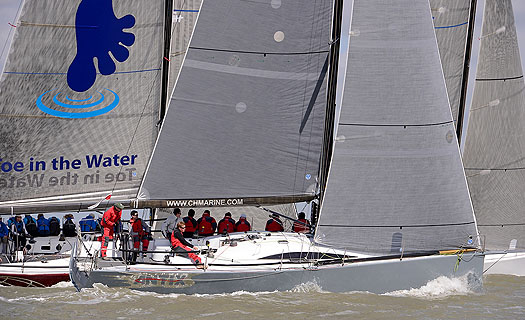
Doing the business. Anthony O'Leary's Ker 39 Antix settling into the groove on the way to the top place in the Easter IRC Championship. Photo: Rick Tomlinson
That in turn augured well for Ireland's Commodore's Cup chances, which then received a further boost last weekend when the crew of another Irish team wannabe, Quokka with Michael Boyd and Niall Dowling, had a winning weekend in the Warsash series with their temporary mount Tarka in anticipation of Quokka's return from the Caribbean at the end of May.
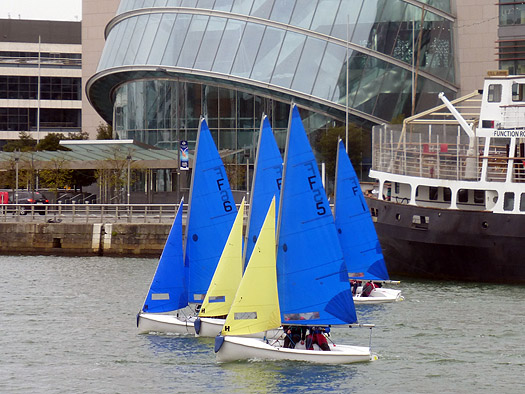
The Colours Match team racing between UCD and Trinity served up top sport in the Liffey, with Trinity winning. Photo: W M Nixon
Meanwhile the universities racing has been brought to life, for although UCD had a convincing win in the racing with the SailFleet J/80s to become the Irish team for the Student Yachting Worlds in France in the Autumn, before April was out the Colours Match in the Liffey under the burgee of the Royal Alfed YC, team-raced in Fireflies, saw Trinity take the honours in convincing style.
But if we're looking for something which really did set things freshly alight, it was out in Hyeres where the ISAF Championship saw the northern duo of Ryan Seaton & Matt McGovern take silver in the 49er, almost immediately moving them up the global rankings from 33 to 11, a quantum leap and no mistake.
The potential for serious success by these two has been fairly obvious for some time, but anyone who sails boats will know only too well how many factors have to come into alignment to get you up among the magic metals at the end of the day.
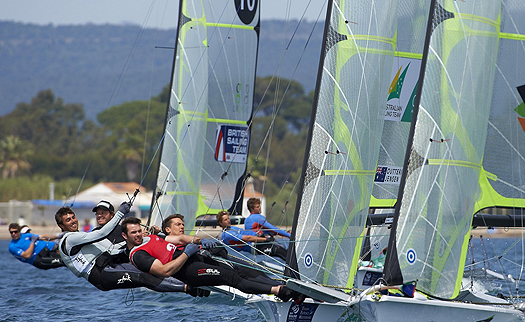
Stars of the silver sea – the Seaton/McGovern team took a silver medal for Ireland at Hyeres.
That their new global status was almost immediately acknowledged by this rankings improvement will in turn add heft to everything they do and say. Thus when, some time ago, the Ryan/Seaton equipe suggested that the 2016 Olympics sailing waters in Brazil are so off the standard as to be a health hazard, it attracted polite attention. But now that they're Number 11, and still counting down, much more notice is taken. And the fact that the Vice President of the International Olympic Committee has suggested, with something approaching despair, that the facilities in Brazil just aren't going to be ready for 2016 at any standard, all gives added legs to the statement from Ireland's 49er crew.
This in turn makes us wonder where world sailing might go in 2016 if the Brazilian setup is still Work in Progress. With tongue only slightly in cheek, we suggest they need look no further than West Cork, where Baltimore Sailing Club has been expanding its facilities to meet increased demand as a club which last year introduced something like 700 people to sailing. That BSC and current Mitsubishi Motors "Club of the Year" Kinsale YC further east along the West Cork coast have both been putting in premises up-grade during the past year, while other clubs have been having it tough, and just about hanging in there in some cases, surely gives pause for thought.
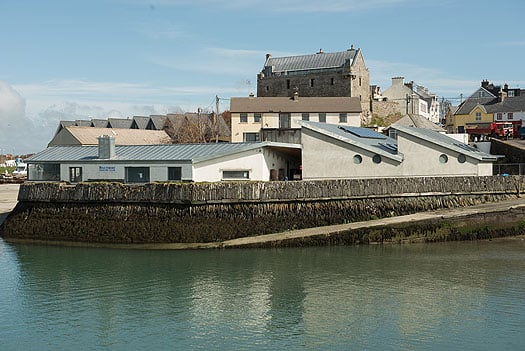
Olympic venue? The extended and up-graded Baltimore Sailing Club is ready and raring to go.
The economic shakeout of the past five years has caused a massive write-down in the value of almost all property and other assets. And in the case of yacht and sailing clubs, there has been a detailed examination of the continuing validity, or otherwise, of established yacht clubs and their traditional business model of quite high subscriptions under-writing other facilities which in turn combine to provide the complete package of an orthodox yacht club.
Inevitably, most clubs are run by officers and committee members who have been involved with the club for many years. Thus, like people who have been running a quality hotel for decades, they may have an inflated notion of what their organisation and its premises are actually worth. Admittedly there's only limited usefulness in comparing a yacht club with a hotel, but lessons can surely be learned. The fact is that hotels today are worth maybe only a third or even less of what they were reckoned to be worth six years ago. And equally, while yachts clubs certainly have a unique package to offer, is it unusual enough and special enough to charge high subscriptions when there are alternative facilities and services available?
The dilemma arises to some extent in all sailing centres. Last week we were discussing the story of the development of Howth YC. Today it is in the seemingly happy situation of having its own marina, thus it theoretically can offer an attractive all-in-one package to any potential member. But the very fact that Howth YC has done so much to help make Howth a colourful and vibrant sailing/fishing port is partly to its own disadvantage. The place has developed as a remarkable focus for top seafood restaurants. This means that the extensive club catering facilities – expected by traditional members - are constantly battling for business with a whole slew of award-winning eateries and characterful pubs nearby.
The problem is more acute in Dun Laoghaire in that the only club within the marina area is the Royal Irish YC. Thus while people may have been loyal members of the National, the Royal St George and the Dun Laoghaire Motor Yacht Club, they find that after going out in the boat, it's very easy to round out the evening aboard in the marina, chatting among themselves or with other crews on boats nearby, and then head straight for home without making their number in their home clubs at all.
This situation is less in evidence at weekends and during special events. But nevertheless it was causing such a lessening in mid-week club vitality that various steps have been taken, and the Royal St George's move to take over berths in a block booking in the outer marina, and service them by a frequent ferry direct from the clubhouse, is a visionary step.
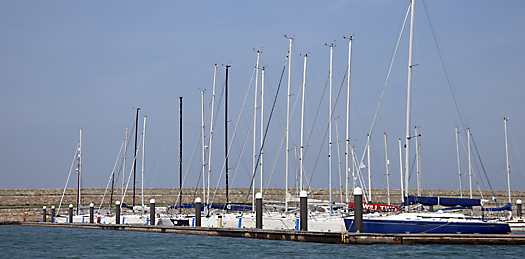
The Royal St George YC has introduced a direct ferry service from the clubhouse to its group of berths in the outer marina in Dun Laoghaire. Photo: David O'Brien
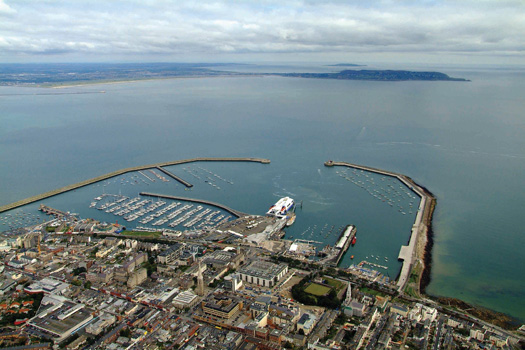
To overcome a lack of direct access to the Dun Laoghaire Marina, the Royal St George YC is running a ferry service from its clubhouse (to right of Stena Ferry, foreground) to the berths in the Outer Marina (upper left) Photo Kevin Dwyer/courtesy ICC.
Nevertheless, in all club administrations there are those who are of the opinion that, whatever the Honorary Treasurers may believe, there has to be a radical re-think of the primary subscription levels. In essence, they're suggesting that the book value of the club has to be written down such that subscriptions are halved. Personally, I haven't much of a notion of how to read a balance sheet, but the dogs in the street know that in the hospitality industry – which, in the broadest sense, is the area in which yacht and sailing clubs operate – values have been savagely slashed, and while charges may still seem high, at least the places are surviving as going concerns.
With continuing reduction in expenses across the board, one area in which there seems to be much work afoot is in the Irish Sailing Association, which in latter days had begun to seem like some hidden corner of the civil service, existing more for the benefit of staff than for the provision of services for sailors. It's amazing to learn that the ISA has sixteen fulltime staff, and a basic annual wages bill of something like €600,000. When you add in the expected benefits, it musty come in total to a very tidy yearly sum.
What on earth do they all do? While you'll invariably find the ISA logo in prominence at some top events, it has to be said that you're entirely unaware of the organisation's existence in any form at more everyday happenings, and it doesn't seem to be because they believe in doing good work by stealth. But with special study groups resulting from the major changes introduced in the ISA setup at the AGM in March, we can only hope that in time the Association will reflect the cost-cutting which has had to be introduced in the clubs, which provide the main part of the ISA's income.
While the administrative structures are rightfully being pared back in many areas of our sport, the coastal infrastructure, on which all forms of seagoing ultimately depend, continues to need maintenance and development. In this area, one very promising green shoot is the news that there are signs of movement in Dunmore East. A dredging programme is getting under way, and just this Tuesday, Minister for Marine Simon Coveney TD convened a meeting in the port to inaugurate a community approach to harbour development which, it is hoped, will help to invigorate the many places around Waterford Estuary, for which Dunmore East has the potential to be the true gateway harbour.
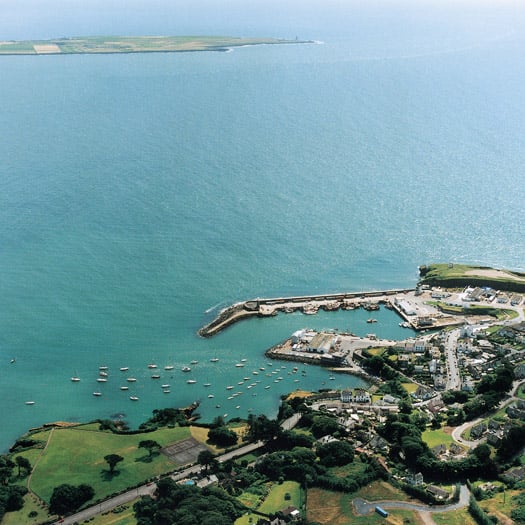
Dunmore East – can it fulfil its potential as the gateway leisure port for the Waterford Estuary? Photo Kevin Dwyer, courtesy ICC
In a more extreme marine environment, it has been confirmed that €6 million will be spent on improving the pier at Doolin in northwest Clare, the nearest mainland quay to the Aran Islands, which also caters for the tour boats cruising along the Cliffs of Moher. While the locals seem well pleased, I wouldn't get too excited about it. This is one very rugged part of the coast, and when you remember that it took €31 million to extend the pier at Kilronan in Inismor, the main Aran island, and another €14 million to build the little harbour at the north end of Inis Meain, the middle Aran island, then we can only hope that €6 million is going to achieve something more than a few boulders being shifted about in the roaring ocean at Doolin.
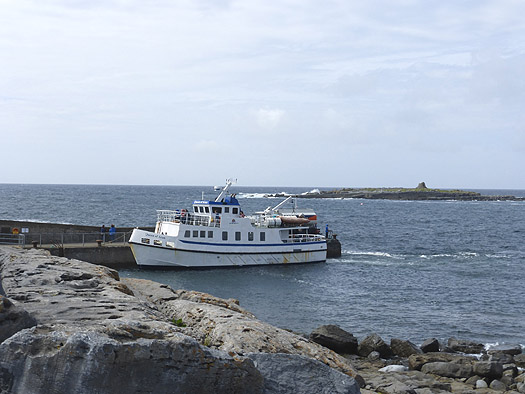
The pier at Doolin is decidedly minimalist, but it provides the shortest sea passage to the Aran Islands. Photo: W M Nixon
But then, in the west all things are possible, and along the ocean seaboard we're told that four thousand signs are being erected to guide people along the Wild Atlantic Way, the new tourism initiative using many smaller coastal roads. Quite so. Frankly, with signage at this level, it will be the Tame Atlantic Way by the time half of them are in place. I have to admit to being a complete curmudgeon in this. In many years of transitting Ireland's west coast by sea and land, one of our favourite areas while driving along the west coast has long been the coast south of Kilkee down to Loop Head, where the cliffs comfortably rival anything the vulgar Cliffs of Moher have to offer, and it is magnificently uncrowded. But not any more, if the Wild Atlantic Way movement has its way.
While I appreciate that visitor numbers have to be kept up and increased whenever and however, it has to be done in a way which appreciates that's what brings people to Ireland (rather than just to Dublin, which is a special case) is an unspoilt landscape. So, four thousand signs just for the one Atlantic Way? Ogden Nash had something to say about this:
"I think that I shall never see,
A billboard lovely as a tree.
But then, until the billboards fall,
I'll never see a tree at all".
Be that as it may, the final sign that suggests things are on the move again is a notice I spotted recently posted at a nearby club, though language pedants might wonder how a notice which manages to mangle so utterly the plural of "dinghy", even to adding a completely superfluous greengrocer's apostrophe, could be seen as encouraging in any way whatsoever.
Well, once you've overcome your opinions about the errors, the underlying message must be good news. More youngsters are evidently coming to sailing this year. And as for the spelling mistake, even that's an improvement. A year ago, the same notice board opened by referring to something called "a dingy", but this time round we have to get to the second line before finding that. And it all comes right for dinghies in the end.
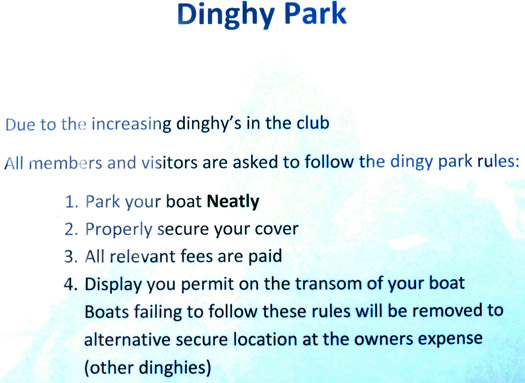
Sign of the times? Whatever about the spelling, this current notice at an Irish sailing club has an underlying message of good news. Photo: W M Nixon



























